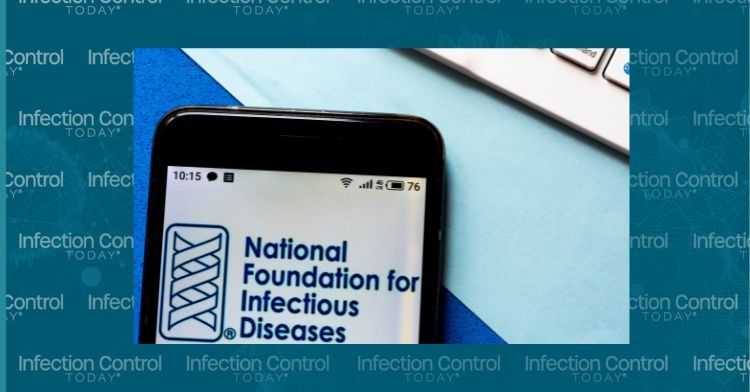Infection
Low Vaccination Concerns Highlight Need for Fall and Winter 2023 Vaccination Campaigns
In this photo illustration, National Foundation for Infectious Diseases logo is seen displayed on a smartphone
(Adobe Stock 346303670 By Игорь Головнёв)
As the United States prepares for the upcoming fall and winter virus season, recent survey data released on September 28, 2023, in an announcement by the National Foundation for Infectious Diseases (NFID) underscore the critical need for comprehensive vaccination efforts. The survey, conducted in September 2023, reveals that a significant portion of the US population remains unconcerned about influenza, COVID-19, and respiratory syncytial virus (RSV) infections, despite their potential severity. Only 22% of U.S. adults express worry about contracting the flu, with similarly low levels of concern regarding COVID-19 (23%) and RSV (19%). Moreover, vaccination hesitancy persists, as 43% of adults do not plan to or are uncertain about getting the influenza vaccine, and only 40% intend to receive the COVID-19 vaccine. These findings highlight the urgent need for public health campaigns to promote vaccination, especially among high-risk populations.
Robert H. Hopkins, Jr, MD, medical director of the NFID, exclusively told Infection Control Today, “The most crucial step to protect yourself and your loved ones from getting respiratory diseases this season is to get vaccinated. The NFID survey found that many US adults underestimate the seriousness of influenza, COVID-19, RSV, and pneumococcal disease, and do not plan to get vaccinated this season. For the first time, we have effective vaccines for all these diseases. As healthcare professionals, we must continue to educate patients and colleagues about the importance of vaccination to help prevent illness, hospitalization, and death.”
The NFID survey data reveals alarming trends and attitudes among American adults. Even though 65% of survey respondents acknowledge vaccination as the most effective way to prevent hospitalizations and deaths due to influenza, a significant number exhibit hesitancy or outright refusal to be vaccinated. This reluctance stems from unfounded fears of side effects, lack of trust in vaccines, and the misguided belief that vaccines are ineffective. Public health experts stress the urgent need to address these baseless concerns and promote accurate expectations about the benefits of vaccination.
“As health care professionals, we need to address these unfounded concerns and create realistic expectations about what vaccines can and cannot do,” NFID President Patricia (Patsy) A. Stinchfield, RN, MS, CPNP, said in the press release. “Even in cases when vaccination does not prevent infection entirely, getting vaccinated can help protect against serious complications, including hospitalization and death.”
The CDC and NFID have jointly called for vaccination against influenza, COVID-19, and RSV for everyone aged 6 months and older. Health experts emphasize that, for the first time, preventive measures are available for these 3 major respiratory viruses. This comprehensive approach is crucial to protect individuals at higher risk of severe disease, including infants, young children, pregnant individuals, older adults, and those with chronic health conditions, such as diabetes, heart and lung conditions, and cancer.
One of the key challenges highlighted in the survey is the reluctance to coadminister influenza and COVID-19 vaccines, with only 38% of respondents expressing willingness to receive both vaccines simultaneously. This underscores the need for health care professionals to educate patients about the safety and benefits of coadministered vaccines, especially as influenza and COVID-19 vaccines may be recommended simultaneously.
The data also reveal disparities in vaccination coverage, both for influenza and COVID-19. During the 2022-2023 season, only 47% of U.S. adults received a flu vaccine, down from 49% the previous season. Older adults were more likely to get vaccinated, with 70% of those aged 65 and older receiving the influenza vaccine. However, COVID-19 vaccination rates have declined, with only 20% of U.S. adults receiving the bivalent COVID-19 vaccine. Alarmingly, more than half (57%) of adults aged 65 and older did not receive the COVID-19 bivalent vaccine, putting them at increased risk for severe outcomes.
As discussed during the announcement, expectant mothers and young children are at greater risk of hospitalization and severe complications from both COVID-19 and influenza. However, only 47% of pregnant women have received the influenza vaccine and even fewer, only 27%, have received the COVID-19 bivalent booster vaccine during their pregnancy, indicating suboptimal vaccination rates. Additionally, racial and ethnic disparities in vaccination coverage persist, with variations in rates among different population groups. This underscores the importance of targeted educational efforts and tailored approaches to overcome barriers to vaccination.
Considering these findings, health care professionals play a critical role in advocating for vaccination and addressing patient concerns. Trust in health care professionals remains high, with 75% of adults trusting them for information about vaccines. As influenza season arrives, health care providers have a unique opportunity to discuss vaccination, including pneumococcal vaccination, with patients. Pneumococcal disease can be a serious complication of influenza, especially for individuals with chronic health conditions.
Overall, the NFID survey data underscore the urgent need for robust fall and winter vaccination campaigns to protect the US population from the combined threat of influenza, COVID-19, and RSV. Addressing vaccine hesitancy, promoting coadministered vaccines, and reducing disparities in vaccination coverage are crucial steps in safeguarding public health during the upcoming virus season. Public health experts emphasize that vaccination remains the most effective tool in preventing severe illness and complications from respiratory viruses, and they urge all eligible individuals to get vaccinated.

